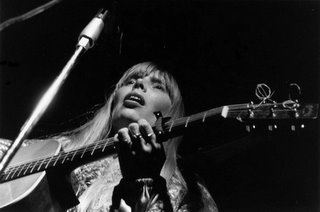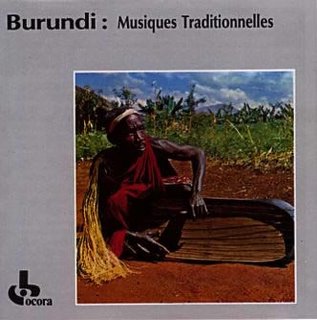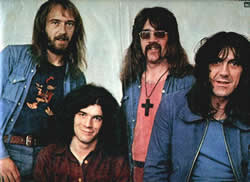
Joni Mitchell is rarely heaped in with the names of Western musical safarists who’ve delved into African music for influence, inspiration, collaboration and outright lifting. But as can clearly be heard on "The Jungle Line" from 1975’s The Hissing of Summer Lawns, she was among the first Western pop stars to blatantly swipe an African backing track. It’s not quite a sample. Here she simply plays along with a recording of court drumming from Burundi. Sort of the same way that Daniel Johnston would later make up lyrics and melodies to sing along with old big band instrumentals. The song is about the French artist Henri Rousseau, who did his own safari bit. It’s an inspired borrowing. Much more so than anything Moby ever did. I’ve never really made peace with The Hissing of Summer Lawns. It has some of the same jazz-ish L.A. studio session dudes as Court and Spark, but it’s not quite as romantic or made for Sunday mornings.

Ethnomusicology students can go on at length about the borrowings of Paul Simon and Peter Gabriel, the questionable arrangements for royalty payments made by groups like Deep Forest who sample field recordings of traditional music and often fail to pay the proper performers, because of the difficulty of finding out who appeared on a field recording in the rain forests of New Guinea or in the jungles of Camaroon. And say you get the names right, how do you cut the check and find the guy 20 years later? It proves a big challenge. Then there’s the problem of assuming that there’s no known author who deserves credit for songs sung deep in the forest. Whoever’s singing it gets credit, but maybe he learned it from a guy in a neighboring village. Maybe that guy wrote it. Semesters are devoted to such griping.
As everybody knows, Paul Simon famously worked with several South African groups, and he’s probably most responsible for the American success of Zulu choral groups like Ladysmith Black Mambazo. Peter Gabriel brought Senegalese singer Youssou N'Dour to the attention of non-African audiences.
But borrowing, quoting, transforming and transmuting other people’s ideas and it’s the nature of musical inspiration. I was happy to read in The Guardian recently that tropicalista Gilberto Gil, now Brazil’s minister of culture, is speaking out about how counterproductive copyright laws really are and how they ultimately stifle creativity.
Ideally the borrowings and musical ricochets and reverberations never stop. Joni Mitchell wasn’t the only one to riff off the Burundis. Deep Forest took what I consider to be one of the most beautiful recordings I’ve ever heard, a track called "Akazehe with Two Young Girls" from a Radio France/Ocora record of traditional music from Burundi (which is far superior to the Nonesuch World Explorer re-issue of their Burundi disc), and they bollocksed it up with the techno bilge. I’m pretty sure that Adam and the Ants did a tune that borrows the martial-sounding patterns of Burundi court drumming, too. I’ve never read any mention of the connection, but whenever I hear Tom Waits singing it makes me think of the this track of Burundian "whisper singing" also heard on the Ocora record. And those who’ve been converted (via the success of Konono #1) the glories of heavy-duty thumb-piano heroics might want to check out the tracks of three-part sanza (Burundi’s version of the mbira).
If, in someone’s mind, Joni Mitchell did damage to the musical legacy of Burundi, you can say she got hers when Counting Crows covered "Big Yellow Taxi" (Bob Dylan’s version didn’t do her any favors either.) But before Counting Crows had their way with Joni, the Scottish rockers Nazareth did a mighty tribute to her with their version of "This Flight Tonight." It’s got all the best flavors of AC/DC and Motorhead, but they’re Scottish, and it’s a Joni Mitchell tune.
No comments:
Post a Comment